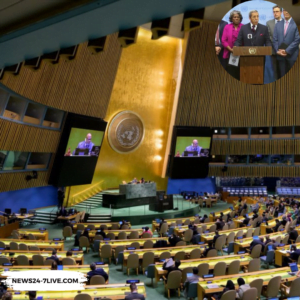The United Nations General Assembly has approved adoption of the first global resolution on artificial intelligence (AI). This AI resolution proposed by the United States and co-sponsored by China along with over 120 other nations, protecting personal data, and monitoring AI for potential risks.

Also Read: Neuralink’s First Patient Plays Chess Using Mind Control
The AI resolution addresses the need for AI systems to be “safe, secure, and trustworthy” while respecting human rights throughout their design, development, deployment, and use.
It addresses AI’s potential to accelerate progress towards achieving the 17 Sustainable Development Goals (SDGs) set by the United Nations.
The AI resolution urges all member states and stakeholders to refrain from using AI systems that operate in violation of international human rights law or undue risks to human rights enjoyment.
It stresses the importance of bridging the digital divide between developed and developing nations, ensuring inclusive access to AI technologies, and enhancing digital literacy.
The AI resolution recognizes the nature of AI governance and calls for continued collaboration to develop regulatory and governance frameworks.
It acknowledges the role of various stakeholders, including states, the private sector, civil society, research organizations, and the media, in advancing safe and responsible AI development.
The AI resolution enjoys broad international support, with more than 120 member states co-sponsoring it, showing a global consensus on the need to govern AI technology.
Representatives from various countries, including the United States, China, Japan, the Netherlands, and the United Kingdom, have voiced support for the resolution, addressing its importance in promoting multilateralism and addressing shared challenges.
Spanning several months to negotiate a text that shows the interests and perspectives of UN member states.
Also Read: Nvidia Unveils World’s Most Powerful Chip Blackwell B200
While the AI resolution is non-binding, it serves as a foundational framework for guiding future discussions and actions related to AI regulation and governance.
It underlines the need for global consensus on ensuring the responsible and ethical development and use of AI technologies.
The AI resolution with other ongoing initiatives, including the European Union’s efforts to establish AI rules and the United States’ push for AI regulation at the national level.
Governments, international organizations, and other stakeholders are encouraged to collaborate in developing and implementing regulatory frameworks that prioritize human rights, safety, and security in AI deployment.
Backed by the United States and co-sponsored by 123 countries, including China, the resolution was adopted without a vote, a rare global consensus among the 193 UN member nations.
The AI resolution addresses the importance of safeguarding human rights in all aspects of AI design, development, and deployment.
It calls for AI systems to operate in compliance with international human rights law to ensure the protection and promotion of fundamental freedoms.
Recognizing the potential of AI to accelerate progress towards the 17 SDGs, the resolution with the UN’s agenda for sustainable development planning to harness AI for inclusive growth and equitable access to technology.
Also Read: Apple in Talks with Google to Integrate Gemini AI for iPhone Features
Acknowledging the disparities in technological development, particularly between developed and developing nations, the resolution urges cooperation and support to bridge the digital divide.
It addresses the importance of inclusive access and digital literacy to ensure all countries benefit from AI advancements.
The AI resolution calls for the development and support of regulatory and governance approaches to ensure the safe, secure, and trustworthy use of AI.
It highlights the need for collaboration among states, private sector, civil society, and other stakeholders to establish effective frameworks.
The adoption of this resolution sets a precedent for international efforts to regulate emerging technologies.
It shows the UN’s commitment to addressing the ethical, legal, and social implications of AI on a global scale.
The resolution underlines the role of various stakeholders, including governments, tech communities, academia, and media, in shaping AI policies and practices. It addresses the shared responsibility in governing AI to mitigate risks and maximize its benefits.
The AI resolution complements existing UN initiatives, such as the work of the International Telecommunication Union (ITU) and the UN Educational, Scientific and Cultural Organization (UNESCO), towards responsible AI governance.
Also Read: Sony PlayStation 5 Pro: 3x Faster GPU, With PSSR Support and More




















